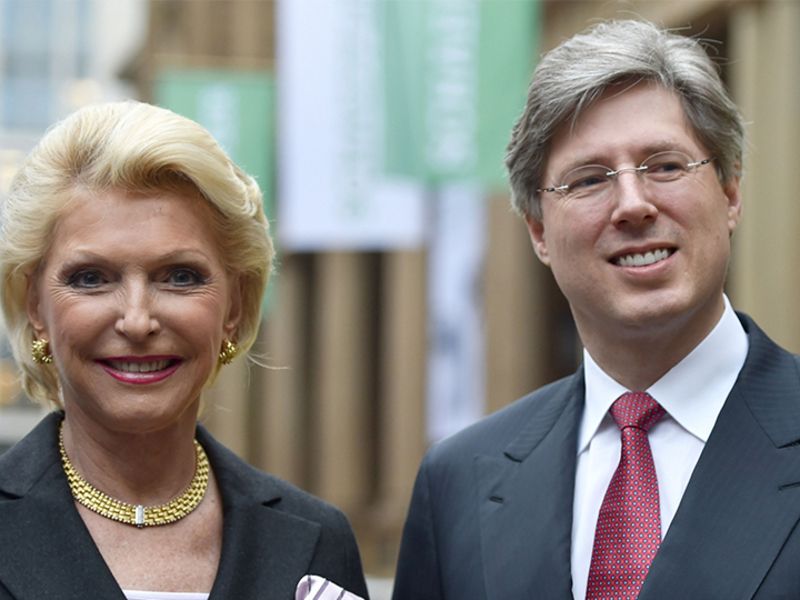
A lot can happen in two-and-a-half years.
In early 2018, Georg Schaeffler became Germany’s richest person as shares of Continental AG, the vehicle supplier in which he and his mother — Maria-Elisabeth Schaeffler-Thumann — own a major stake, surged in price. At the time, their combined fortune totaled $35 billion.
They are now worth about a quarter of that. That’s partly due to the coronavirus pandemic, which has slowed auto production and significantly curbed sales, as well as the industry’s broader shift toward electric cars.
The Schaefflers ended each of the last two years less well-off than they began, and 2020 may be the same. Both have lost about a quarter of their wealth so far this year, according the Bloomberg Billionaires Index, a listing of the world’s 500 richest people.
While they are still very wealthy, the slump in the Schaefflers’ fortune is among the biggest on the Bloomberg index and highlights the slowdown in global vehicle production. Georg, 55, and Maria-Elisabeth, 78, also control Schaeffler AG, the German engineering group that has faced similar pressures as Continental. Shares in both companies have tumbled by more than a fifth this year.
A spokesman for the Schaefflers declined to comment.
Such swings are rare for multi-generational family fortunes of this size, largely because of diversification.
While founders can be single-minded in their pursuits, their heirs often look to reduce risks by branching out into new ventures.
For example, the Mars family began as candy makers but have since pushed into pet-care products, which now comprise about half of annual sales of the business behind their $120 billion fortune.
Germany’s Reimann clan have parlayed the proceeds of a chemicals business into a consumer goods empire spanning Krispy Kreme Doughnuts and Panera Bread restaurants.
The Schaefflers are now worth $8.5 billion, according to Bloomberg’s wealth index, though the family may have arrangements to protect them against slumping share prices.
Other fortunes linked to the auto industry are also suffering during the pandemic.
Susanne Klatten and Stefan Quandt, major shareholders of BMW Group, and Hyundai Group Chairman Chung Mong-Koo have seen their fortunes fall about 10 percent this year, according to the Bloomberg index.
Still, the Schaefflers have bounced back before. Their debt-fueled takeover of Continental forced them to ask for emergency support after credit markets contracted in the 2008 financial crisis, but the company’s share price then surged between 2009 and early 2018.
In a sign of another potential rebound, Continental’s shares have climbed more than 50 percent since mid-March, though the company has said its outlook for the rest of the year remains uncertain.
Continental remains the world’s fourth-largest auto supplier with $35.3 billion in 2019 sales from automakers, according to Automotive News. The company mapped out plans last year for a fundamental overhaul to restore weak profits. The company then announced in March that it would explore additional cost cuts and potential plant closures and later said it would cut its dividend payout to save about 350 million euros ($413.5 million).
Meanwhile, Schaeffler AG is considering a fresh cost-cutting program to deal with the fallout from the coronavirus pandemic.
“We have gotten through the first trough, now we need to look at what we can do next,” Schaeffler CEO Klaus Rosenfeld said Tuesday in an interview to discuss first-half earnings. “We’re cautiously optimistic that the crisis will slowly abate.”
Georg’s father and uncle founded Schaeffler — then called INA-Holding Schaeffler KG — in 1946 to make wooden handcarts. The company expanded in 1949 after Georg’s father, an inventor, developed a method to make critical machine components more reliable.
By the early 1990s, Schaeffler had more than 20,000 workers at plants on three continents. When his father died in 1996, Georg Schaeffler inherited 80 percent of the ball-bearing business that carries his surname while his mother inherited the rest.
Both serve on the supervisory boards of Continental and Schaeffler, which held an initial public offering in 2015 to help pay down its debts.
While Georg grew up as the heir to an engineering empire, obtaining degrees in business and law, Maria-Elisabeth studied medicine and never expected to embark on a business career.
Born in Prague and raised in Vienna, she was a medical student in the Austrian capital when she met Georg’s father. They married when she was 22, and Maria-Elisabeth eventually became involved in her family’s business affairs.
“I grew into it step by step,” she said in a 2001 interview with the German newspaper Welt am Sonntag. “When my son was old enough, my husband and myself decided I should get involved professionally. That’s why I completed — I must correct myself — was privileged to complete, an apprenticeship with my husband, which was excellent.”